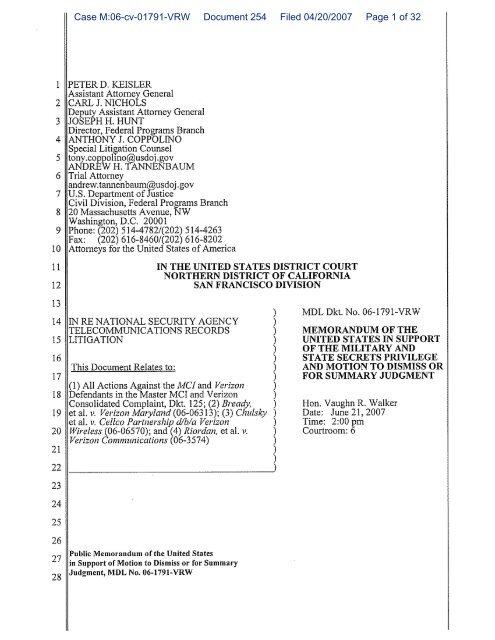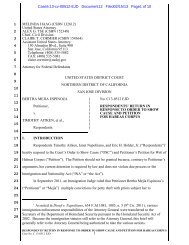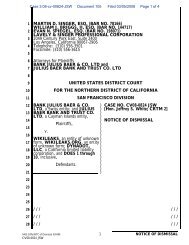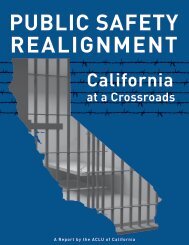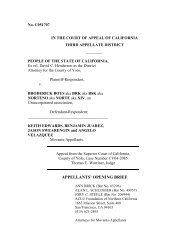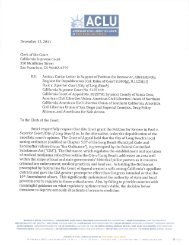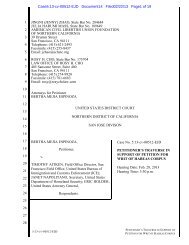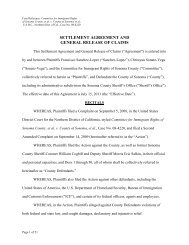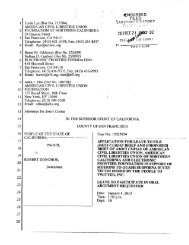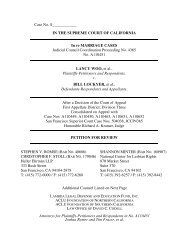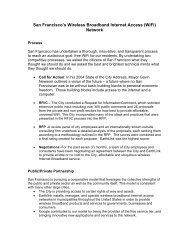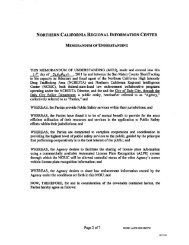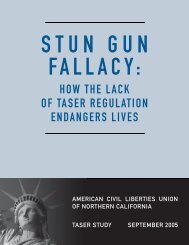1 of 2 - ACLU of Northern California
1 of 2 - ACLU of Northern California
1 of 2 - ACLU of Northern California
You also want an ePaper? Increase the reach of your titles
YUMPU automatically turns print PDFs into web optimized ePapers that Google loves.
Case M:06-cv-01791-VRW Document 254 Filed 04/20/2007 Page 1 <strong>of</strong> 32123456789t0111213141516171819202122232425262728PETER D. KEISLERAssistant Attorney GeneralCARL J. NICHOLSDeputy Assistant Attorney GeneralJOSEPH H. HUNTDirector, Federal Programs BranchANTHONY J. COPPOLINOSpecial Litigation Counseltony.coppolino@usdoj.govANDREW H. TANNENBAUMTrial Attorneyandrew.tannenbaum@usdoj.govU.S. Department <strong>of</strong> JusticeCivil Division, Federal Programs Branch20 Massachusetts Avenue, NWWashington, D.C. 20001Phone: (202) 514-4782/(202) 514-4263Fax: (202) 616-8460/(202) 616-8202Attorneys for the United States <strong>of</strong> AmericaIN THE UNITED STATES DISTINCT COURTNORTHERN DISTRICT OF CALIFORNIASAN FRANCISCO DIVISIONIN RE NATIONAL SECU~TY AGENCYTELECOMMUNICATIONS RECORDSLITIGATIONThis Document Relates to:(1) All Actions Against the MCIand VerizonDefendants in the Master MCI and VerizonConsolidated Complaint, Dkt. 125; (2) Bready,et al. v. Verizon Maryland(06-06313); (3) Chulskyat at. v. Celleo Partnership d/b/a VerizonWireless (06-06570); and (4) Riordan, et al. v.Verizon Communications (06-3574)Public Memorandum <strong>of</strong> the United Statesin Support <strong>of</strong> Motion to Dismiss or for SummaryJudgment, MDL No. 06-1791-VRW)MDL Dkt. No. 06-1791-VRWMEMORANDUM OF THEUNITED STATES IN SUPPORTOF THE MILITARY ANDSTATE SECRETS PRIVILEGEAND MOTION TO DISMISS ORFOR SUMMARY JUDGMENTHon. Vaughn R. WalkerDate: June 21, 2007Time: 2:00 pmCourtroom: 6
Case M:06-cv-01791-VRW Document 254 Filed 04/20/2007 Page 2 <strong>of</strong> 3212345678910111213141516171819202122232425262728(U) TABLE OF CONTENTS(U) INTRODUCTION .......................................................0-J) BACKGROUND ......................................................... 7A. (U) The Plaintiffs’ Claims Against Verizon ........................... 7B. (U) The United States’ State Secrets Privilege Assertion .................9(U) ARGUMENT . . . . ...................................................... 12I. CtJ) WHERE STATE SECRETS ARE NEEDED TO RESOLVE A CASE,THE MATTER MUST BE DISMISSED .................................. 13II.III.A. (U) The State Secrets Privilege Bars Use <strong>of</strong> Privileged InformationRegardless <strong>of</strong> a Litigant’s Need .................................... 18B. (U) Where the State Secrets Are Central to the Resolution <strong>of</strong> aCase or Needed to Litigate the Claims and Defenses, the CaseCannot Proceed ................................................. 15C. (U) The Court in Hepting Misapplied the Standard <strong>of</strong> Review andFailed to Determine the Consequences <strong>of</strong> the Government’s PrivilegeAssertion ..................................................... 171. (U) The Court’s Application <strong>of</strong> the Standard <strong>of</strong> Review inHepting Was Erroneous .................................... 172. (U) The Court Failed to Assess the Consequences <strong>of</strong> theState Secrets Privilege in Hepting ............................20(U) THE UNITED STATES HAS PROPERLY ASSERTED THESTATE SECRETS PRIVILEGE IN THIS CASE ............................ 25(U) INFORMATION SUBJECT TO THE STATE SECRETS PRIVILEGEIS NECESSARY TO ADJUDICATE PLAINTIFFS’ CLAIMS AND, THUS,THIS ACTION CANNOT PROCEED .................................... 25Public Memorandum <strong>of</strong> the United Statesin Support <strong>of</strong> Motion to Dismiss or for SummaryJudgment, MDL No. 06-1791-VRWt
Case M:06-cv-01791-VRW Document 254 Filed 04/20/2007 Page 4 <strong>of</strong> 32123456789I0111213t41516171819202122232425262728(U) STATUTORY PRIVILEGE CLAIMS HAVE ALSO BEEN PROPERLYRAISED IN THIS CASE ............................................... 54CONCLUSION ......................................................... 57Public Memorandum <strong>of</strong> the United Statesin Support <strong>of</strong> Motion to Dismiss or for SummaryJudgment, MDL No. 06-1791-VRW
Case M:06-cv-01791-VRW Document 254 Filed 04/20/2007 Page 5 <strong>of</strong> 3212345678910111213141516171819202122232425262728Cases(U) TABLE OF AUTHORITIES~ICLUv. NSA, 438 F. Supp. 2d 754 (E.D. Mich. 2006) ............................... 3/lfshar v. Department <strong>of</strong> State, 702 F.2d 1125 (D.C. Cir. 1983) .......................34Barefordv. General Dynamics Corp, 973 F.2d 1138 (5th Cir. 1992) ............. 6, 17, 35Blackv. United States, 62 F.3d 1115 (8th Cir. 1995),cert. denied, 517 U.S. 1154 (1996) .......................................15CIA v. Sims, 471 U.S. 159 (1985) .............................................. 55City <strong>of</strong> Los Angeles v. Lyons, 461 U.S. 95 (1983) ...............................28, 55DaimlerChtysler Corp. v. Cuno, 126 S. Ct. 1854 (2006) ............................37Department <strong>of</strong> the Navy v. Egan, 484 U.S. 518 (1988) ..............................13Directot; Office <strong>of</strong> Workers’ Comp. Prog~’ams v. Newport NewsShipbuilding & Dry Dock Co., 514 U.S. 122 (1995) ..........................42Edmonds v. U.S. Department <strong>of</strong> Justice, 323 F. Supp. 2d 65 (D.D.C. 2004)aff’d, 161 Fed. Appx. 6, 045286 (D.C. Cir. 2005), cert. denied,126 S. Ct. 734 (2005) ...........................................16, 22, 34Elk Grove Unified Sch. Dist. v. Newdow, 542 U.S. 1 (2004) .........................37Ellsberg v. Mitchell, 709 F.2d 51 (D.C. Cir. 1983), cert. denied sub nom.Russo v. Mitchell, 465 U.S. 1038 (1984) ................................passimEllsberg v. Mitchell, 807 F.2d 204 (D.C. Cir. 1986) ................................51El-Masri v. Tenet, 437 F. Supp. 2d 530 (E.D. Va. 2006)aff’d2007 WL 625130 (4th Cir. Mar. 2, 2007) ...............................6El-Masri v. United States, __.F.3d __ 2007 WL 625130 (4th Cir. 2007) ............passimPublic Memorandum <strong>of</strong> the United Statesin Support <strong>of</strong> Motion to Dismiss or for SummaryJudgment, MDL No. 06-1791-VRW
Case M:06-cv-01791-VRW Document 254 Filed 04/20/2007 Page 6 <strong>of</strong> 3212345678910111213141516171819202122232425262728Fitzgerald v. Penthouse hTt’l, Ltd., 776 F.2d 1236 (4th Cir. 1985) ..................passimFitzgibbon v. CIA, 911 F.2d 755 (D.C. Cir. t990) .................................54Halkin v. Hehns, 690 F.2d 977 (D.C. Cir. 1982) ............................... passimHalkin v. Hehns, 598 F.2d 1 (D.C. Cir. 1978) ................................. passhnHayden v. Nat’l Security Agency, 608 F.2d 1381 (D.C: Cir. 1979) ....................54Hepting. v. AT&T, 439 F. Supp. 2d 934 (N.D. Cal. 2006) ......................... passimIn re United States, 872 F.2d 472 (D.C. Cir. 1989) .................................13Kasza v. Browner, 133 F.3d t 159 (9th Cir.),cert. denied, 525 U.S. 967 (1998) ....................................passimLewis v. Casey, 518 U.S. 343 (1996) ............................................ 39Linderv. Nat’l Security Agency, 94 F.3d 693 (D.C. Cir. 1996) ........................54Lz~jan v. Defenders <strong>of</strong>~Vildlife, 504 U.S. 555 (1992) ................................36Molerio v. FederalBureau <strong>of</strong> Investigation, 749 F. 2d 815 (D.C. Cir. 1984) .... .......... 51MilitatyAudit Project v. Casey, 656 F.2d at 714 (D.C. Cir. 1981) .....................20Maxwellv. First National Bank <strong>of</strong> Matyland, 143 F.R.D. 590 (D. Md. 1992) ....... 6, 16, 22Northrop Corp. v. McDonnellDouglas Corp., 751 F.2d 395 (D.C. Cir. 1984) ........... 15O’Shea v. Littleton, 414 U.S. 488 (1974) ........................................ 37People for the American Way Foundation v. National Security Agency,462 F. Supp. 2d 21 (D.D.C. 2006) ........................................ 55Phillips Petroleum Co. v. Shutts, 472 U.S. 797 (1985) ..............................38Public Memorandum <strong>of</strong> the United Statesin Support <strong>of</strong> Motion to Dismiss or for Summary-Judgment, MDL No. 06-1791-VRW
Case M:06-cv-01791-VRW Document 254 Filed 04/20/2007 Page 7 <strong>of</strong> 32123456789101112131415t6171819202122232425262728Rainesv. Byrd, 521 U.S. 811 (1997) ............................................ 37$terlh~gv. Tenet, 416 F.3d 338 (4th Cir. 2005) ........................... 16, 21, 22, 51$melt v. County <strong>of</strong> Orange, 447 F.3d 673 (9th Cir. 2006) ............................38;mith v. MatTland, 442 U.S. 735 (1979) .........................................53;nepp v. United States, 444 U.S. 507 (1980) ......................................55Tenet v. Doe, 544 U.S. 1 (2005) ........................................... passimTerkel v. AT&TCorp., 441 F. Supp. 2d 899 (N.D. Ill. 2006) ...................... passimThe Founding Church <strong>of</strong> Scientology <strong>of</strong> Washington, D.C., Inc. v.Nat’l Security Agency, 610 F.2d 824 (D.C. Cir. 1979) ........................54Tilden v. Tenet, 140 F. Supp. 2d 623 (E.D. Va. 2000) ............................... 14Totten v. United States, 92 U.S. 105 (1875) ...................................passimUnited States v. Burr; 25 F. Cas. 30 (C.C.D. Va. 1807) ............................. 13United States v. Nixon, 418 U.S. 683 (1974) ......................................13United States v. Ott, 827 F.2d 473 (9th Cir. 1987) .................................42United States v. Reynolds, 345 U.S. 1 (1953) ..................................passimVernoniaSch. Dist. v. Action, 515 U.S. 646 (1995) ................................53Warth v. Seldin, 422 U.S. 490 (1975) ...........................................37Weinberger v. Catholic Action <strong>of</strong> Hawaii454 U.S. 139 (1981) ................................................... 29Zuckerbraun v. United States, 935 F.2d 544 (2d Cir. 1991) .................... 21, 23, 39United States ex rel. Ross v. LaVallee, 341 F.2d 823 (2d Cir. 1965) ................... 43Public Memorandum <strong>of</strong> the United Statesin Support <strong>of</strong> Motion to Dismiss or for SummaryJudgment, MDL No. 06-1791-VRW
Case M:06-cv-01791-VRW Document 254 Filed 04/20/2007 Page 8 <strong>of</strong> 321345678910111213141516171819202122232425262728Statutes18 U.S.C.18 U.S.C.18 U.S.C.18 U.S.C.18 U.S.C.18 U.S.C.18 U.S.C.18 U.S.C.18 U.S.C.18 U.S.C.18 U.S.C.18 U.S.C.47 U.S.C.47 U.S.C.§ 2510(11) ........................................................ 42§ 2520(a) ......................................................... 42§ 2702(a) ......................................................... 42§ 2702(a)(1) ........................................................ 8§ 2702(a)(2) ........................................................ 8§ 2702(a)(3) ........................................................ 8§2711(1) ......................................................... 42§ 2707(c) ........................................................ 42§ 2511(1)(a) ........................................................ 8§ 2511(1)(c) ........................................................ 8§ 251 l(1)(d) ....................................................... 8§ 251 l(3)(a) ........................................................ 8§ 605 .......................................................... 8, 43§ 605(a) .......................................................... 4347 U.S.C. § 605(e)(3)(A) ..................................................... 4350 U.S.C. § 1801(f) ......................................................... 4250 U.S.C. § 1801(k) ......................................................... 4250 U.S.C. § 1809 ............................................................ 850 U.S.C. § 1810 ........................................................... 42Section 6 <strong>of</strong> the National Security Agency Act <strong>of</strong> 1959,Pub. L. No. 86-36, § 6, 73 Stat. 63, 64,codified at 50 U.S.C. § 402 note ...................................54, 55, 56Section 102A(i)(1) <strong>of</strong> the Intelligence Reform and Terrorism Prevention Act<strong>of</strong> 2004, Pub. L. No. 108-458, 118 Stat. 3638 (Dec. 17, 2004),codified at 50 U.S.C. § 403-1(i)(1) .......................................54Public Memorandum <strong>of</strong> the United Statesin Support <strong>of</strong> Motion to Dismiss or for SummaryJudgment, MDL No. 06-1791-VRW
Case M:06-cv-01791-VRW Document 254 Filed 04/20/2007 Page 9 <strong>of</strong> 3212345678910111213141516171819202122232425262728(U) INTRODUCTION~(U) For the second time in this MDL proceeding, the United States is asserting the statesecrets privilege in actions before this Court to preclude the disclosure <strong>of</strong> informationconcerning alleged classified intelligence activities <strong>of</strong> the National Security Agency (NSA),including information confirming or denying whether a telecommunications company hasassisted the NSA with any such alleged activities. Plaintiffs in these actions allege that theVerizon Defendants ("Verizon"), including the MCI Defendants ("MCI"), have unlawfullyprovided the NSA with access to the content <strong>of</strong> Plaintiffs’ communications as well as withrecords related to Plaintiffs’ communications]-(U) In May 2006, the United States asserted the state secrets privilege and filed a motionto dismiss or for summary judgment in Hepting. v. AT&Z 439 F. Supp. 2d 934 ~.D. Cal.2006)---a case raising allegations against AT&T substantially similar to those made againstVerizon in these cases. The Court’s order denying the Government’s motions in HepthTg is now~ (U) Classification markings in this memorandum are in accordance with the marking systemdescribed in the In Camera, Ex Parte Classified Declaration <strong>of</strong>Lt. Gen. Keith B. Alexander,Director, Nation~l Security Agency ("b~ Camera Alexander Decl.’).2 (U) See Master Consolidated Complaint Against MCI Defendants and Verizon Defendants,Dkt.125 (hereafter "Master Verizon Compl."); see also Riordan, et al. v. VerizonCommunications (MDL 06-3574); Bready, et al. v. Verizon Matyland (MDL 06-06313);Chulsky et al. v. Cellco Partnership d/b/a Verizon~, Wireless (MDL 06-06570) (separatecomplaints pending in the MDL against Verizon entities). For a list <strong>of</strong> all actions against theMCI and Verizon Defendants that have been consolidated in the Master MCI and VerizonConsolidated Complaint, see MDL Status Report <strong>of</strong> AT&T and Bel! South Corporation, Dkt.197, at 10-11. Any reference to "Verizon" or "Verizon Defendants’ in this brief includes allVerizon Defendants and entities in all cases brought in this MDL, see Dkt. 61-1 (Join~,CaseManagement Statement) at 2, n.4. In particular, unless otherwise indicated, "Verizon’ or."Verizon Defendants" also specifically includes the MCI Defendants, which are now a part <strong>of</strong>Verizon, even though "MCI" may at times be referenced separateIy.Public Memorandum <strong>of</strong> the United Statesin Support <strong>of</strong> Motion to Dismiss or for SummaryJudgment, MDL No. 06-1791-VRW
Case M:06-cv-01791-VRW Document 254 Filed 04/20/2007 Page 10 <strong>of</strong> 3213456789101112131415161718192O2122232425262728pending before the Court <strong>of</strong> Appeals for the Ninth Circuit. We respectfully disagree with theCourt’s decision in Hepting, as we set forth herein. And, as we argued in seeking to stayproceedings related to Verizon, the Hepting appeal may resolve, or at least will substantiallyimpact, the same issues in the Verizon cases. Nonetheless, we respectfully request that theCourt, having permitted these actions to proceed, approach the facts, law, and argumentspresented by the United States with a fresh perspective. The Court is not foreclosed fromreaching a different result here and, for the reasons we set forth below, it should dismiss all casesagainst the Verizon Defendants.(U) As in Hepting, the Plaintiffs here allege that, after the terrorist attacks <strong>of</strong> September11,2001, the President authorized two distinct intelligence gathering activities, involving: (1)the surveillance <strong>of</strong> the content <strong>of</strong> their communications, and (2) the collection <strong>of</strong> records abouttheir communications. With respect to their content surveillance claim, Plaintiffs note that thePresident authorized the NSA to intercept the content <strong>of</strong> international communications to orfrom the United States (i.e., "one-end" foreign communications) reasonably believed to involvemembers or agents <strong>of</strong> al Qaeda or affiliated terrorist organizations--a program acknowledged bythe President and referred to as the Terrorist Surveillance Program or TSP. See, e.g., MasterVerizon Compl. 139-141. Significantly, however, Plaintiffs do not claim that they weresubject to the Terrorist Surveillance Program or otherwise injured by it. Instead, they allege thatthe NSA’s content surveillance activities go well beyond the TSP and extend to the interception<strong>of</strong> millions <strong>of</strong> domestic and international communications made by ordinary Americans andtransmitted by MCI and Verizon. See, e.g., id. 165 ("the NSA intercepts millions <strong>of</strong>communications made or received by people inside the United States, and uses powerfulcomputers to scan their contents for particular names, numbers, words, or phrases").(U) The Court in Hepting recognized that the United States has denied these allegations<strong>of</strong> a so-called "content dragnet" <strong>of</strong> domestic communications. See Hepting, 439 F. Supp. 2d atPublic Memorandum <strong>of</strong> the United Statesin Support <strong>of</strong> Motion to Dismiss or for SummaryJudgment, MDL No. 06-1791-VRW-2-
Case M:06-cv-01791-VRW Document 254 Filed 04/20/2007 Page 11 <strong>of</strong> 3212345678910111213141516171819202122232425262728996. Thus, Plaintiffs’ content surveillance claim in this case (as in Hepting) boils down to anunfounded and highly speculative allegation that they do not believe that the Presidentauthorized only a limited surveillance program directed at certain al Qaeda-related internationalcommunications. Moreover, they demand the opportunity to determine through discovery whatthe NSA has actually done with any alleged assistance <strong>of</strong> the Verizon Defendants. As set forthbelow, such an inquiry cannot be accomplished without disclosing state secrets and therebycausing grave harm to the national security. In particular, we disagree with the Court’sconclusion in HepthTg that discovery into whether a statutory certification was provided inconnection with the TSP could be conducted without revealing state secrets. Such discovery inthese cases would either confirm or deny whether Verizon or MCI assisted with the TSP, a factthat the Director <strong>of</strong> National Intelligence has concluded cannot be disclosed without causing~xceptionally grave harm to the national security. In addition, even apart from the relationshipissue, the process <strong>of</strong>"proving a negative"--that Plaintiffs’ content dragnet allegations arefalse---could not occur without disclosing what the NSA does and does not do. That processwould clearly implicate classified and highly sensitive facts, including operational facts~onceming the TSP that would demonstrate that the program was in fact limited to al Qaedarelatedone-end foreign communications.(U) With respect to Plaintiffs’ claim that the Verizon Defendants have provided the NSAwith records concerning their communications, this case presents the same issue alreadyresolved by this Court in Hepting and by two other courts, each <strong>of</strong> which upheld theGovernment’s state secrets privilege assertion and declined to allow any discovery into suchallegations. See Hepting, 439 F. Supp. 2d at 997-98; Terkel v. AT&TCorp., 441 F. Supp. 2d899, 917 (N.D. Ill. 2006); <strong>ACLU</strong>v. NSA, 438 F. Supp. 2d 754, 765 (E.D. Mich. 2006) (appealpending). While we believe that the proper course in Hepting should have been to dismiss thoseclaims, as the courts in Terkel and A CL U did, nothing warrants this Court from deviating fromPublic Memorandum <strong>of</strong> the United Statesin Support <strong>of</strong> Motion to Dismiss or for SummaryJudgment, MDL No. 06-1791-VRW-3-
Case M:06-cv-01791-VRW Document 254 Filed 04/20/2007 Page 12 <strong>of</strong> 3212345678910111213141516171819202122232425262728its conclusion in Hepting that information confirming or denying an alleged communicationsrecords program cannot be disclosed without causing harm to the national security. In particular,the Government still has not <strong>of</strong>ficially confirmed or denied the existence <strong>of</strong> any alleged recordsprograms, and no statements drawn from the public record can waive the Government’s~rivilege assertion as to this matter.(U) Accordingly, the Director <strong>of</strong> National Intelligence, in conjunction with the Director~fthe NSA, has asserted the state secrets privilege and statutory privileges to protect against thedisclosure <strong>of</strong> several categories <strong>of</strong> information put at issue in these cases, including: (1) whetheror not MCI and/or Verizon had any involvement in the alleged activities--a dragnet <strong>of</strong> contentsurveillance or the provision <strong>of</strong> communication records; (2) whether or not Plaintiffs have beensubject to any <strong>of</strong> the alleged activities; and (3) other information concerning any alleged NSAintelligence activities, sources, or methods, including (a) facts demonstrating that the TSP waslimited to al Qaeda-related international communications and that the NSA does not undertakethe dragnet <strong>of</strong> content surveillance that Plaintiffs allege; and (b) facts that would tend to confirmor deny the existence <strong>of</strong> the alleged communications records activities.(U) In assessing the Government’s privilege assertion and motion to dismiss or forsummary judgment, we ask the Court to keep in mind two central aspects <strong>of</strong> the state secretsprivilege that we believe were not properly applied in Hepting. First, in deciding a state secrets~rivilege assertion, the proper standard <strong>of</strong> review is whether the United States has put forwardeasonable grounds to conclude that disclosure or confirmation 0fthe information at issue wouldharm national security. The Court is required to lend the "utmost deference" to the Executive’siudgment on the matter. As set forth herein, the DNI and NSA Director amply demonstrate thatdisclosure <strong>of</strong> this privileged information risks exceptionally grave harm to the national securityand, thus, that it must be excluded from further proceedings in this litigation. See United StatesReynolds, 345 U.S. t (1953). For the Court to find otherwise, it must conclude that theublic Memorandum <strong>of</strong> the United Statesa Support <strong>of</strong> Motion to Dismiss or for SummaryJudgment, MDL No. 06-1791-VRW -4-
Case M:06-cv-01791-VRW Document 254 Filed 04/20/2007 Page 13 <strong>of</strong> 3212345678910111213141516171819202122232425262728Director <strong>of</strong> National Intelligence’s judgment about the harm <strong>of</strong> disclosure has no reasonablebasis--a conclusion that we respectfully submit would be entirely unfounded.(U) Second, the state secrets privilege requires a court to consider whether the matter canproceed by examining the role that state secrets would play in further proceedings. That is, acourt must ~’look ahead" to whether the privileged information would be needed to litigate thevarious issues that will arise at future stages <strong>of</strong> the case--not merely whether the case canproceed past the pleadings stage. Because privileged information would be central toadjudicating all issues in this action--including fundamental questions regarding the Court’siurisdiction, as well as a variety <strong>of</strong> merits issues, well-established authority requires that thesecases must be dismissed at the outset. See Kasza v. Browner, 133 F.3d 1159 (9th Cir.), cert.~lenied, 525 U.S. 967 (1998). As set forth in more detail below, information within all <strong>of</strong> thezategories <strong>of</strong> the Government’s privilege assertions is required to litigate each one <strong>of</strong> Plaintiffs’zlaims.(U) With respect, we submit that the Court in Hepting incorrectly limited its review <strong>of</strong>Ihe state secrets privilege to whether allegations concerning AT&T’s assistance to the NSAzould proceed past the pleading stage and misapplied the standard <strong>of</strong> review under the statesecrets privilege by not addressing the particular national security harms identified by the DNI inthat case. Instead, because <strong>of</strong> the very harms associated with litigating these cases, the solepurpose <strong>of</strong> which is to disclose highly classified activities, the Court must assess now whetherPlaintiffs’ claims can ultimately be litigated. They cannot. The alleged relationship between theNSA and a telecommunications carrier is a key threshold issue that cannot be decided without:lisclosing state secrets. But wholly apart from that issue, classified information concerningNSA sources and methods are essential to adjudicate every issue in this case. In particular, factszoncerning whether or not Plaintiffs have actually been subject to the alleged surveillanceactivities would be necessary to address their standing but could not be disclosed without harmPublic Memorandum <strong>of</strong> the United Statesin Support <strong>of</strong> Motion to Dismiss or for SummaryIudgment, MDL No. 06-1791-VRW-5-
Case M:06-cv-01791-VRW Document 254 Filed 04/20/2007 Page 14 <strong>of</strong> 3212345678910111213141516171819202122232425262728to national security. Likewise, even assuming arguendo that a relationship exists, the merits <strong>of</strong>Plaintiffs’ claims could not be fully adjudicated without resort to state secrets, includingoperational facts tending to prove that the TSP was narrowly limited and facts confirming ordenying the existence <strong>of</strong> a records program. For these reasons, as set forth further below, theproper application <strong>of</strong> the state secrets privilege requires the dismissal <strong>of</strong> this case.REDACTED TEXT](U) The United States is mindful that the denial <strong>of</strong> a forum for the resolution <strong>of</strong> disputesan be a "drastic remedy." Fitzgerald v. Penthouse Int 7, Ltd., 776 F.2d 1236, 1243 (4th Cir.1985). But it is well established that "the state secrets doctrine finds the greater publicgood--ultimately the less harsh remedy--to be dismissal." Bareford v. General DynamicsCorp., 973 F.2d 1138, 1141 (5th Cir. 1992); Kasza, 133 F.3d at 1167. This is the "requiredresult" even where allegations <strong>of</strong> unlawful or unconstitutional actions are at issue. Halkin v.Hehns (Halkin II), 690 F.2d 977, 1001 (D.C. Cir. 1982); Ma:nvell v. First National Bank <strong>of</strong>Maryland, 143 F.R.D. 590, 598 (D. Md. 1992) (successful invocation <strong>of</strong> state secrets privilegeand other statutory privileges "may defeat worthy claims"). The Plaintiffs’ interests are not the3nly ones at stake, and proceeding to litigate this dispute would lead to a harsh result <strong>of</strong> anotherkind--one that could potentially cause harm to the security <strong>of</strong> all Americans. See El-Masri v.Tenet, 437 F. Supp. 2d 530, 539 (E.D. Va. 2006) ("private interests must give way to thenational interest in preserving state secrets"), aff’d 2007 WL 625130 (4th Cir. Mar. 2, 2007).Public Memorandum <strong>of</strong> the United Statesin Support <strong>of</strong> Motion to Dismiss or for SummaryJudgment, MDL No. 06-1791-VRW-6-
Case M:06-cv-01791-VRW Document 254 Filed 04/20/2007 Page 15 <strong>of</strong> 32123456789t0111213141516171819202122232425262728(U) BACKGROUNDA. (U) The Plaintiffs’ Claims Against Verizon(U) All <strong>of</strong> the Complaints against the Verizon Defendants now before the Courtchallange intelligence activities that were allegedly authorized by the President after the 9/11attacks. Moreover, although Plaintiffs specifically refer to statements by the President, AttorneyGeneral, and Deputy Director <strong>of</strong> National Intelligence concerning the Terrorist SurveillanceProgram, they allege a program much broader than the TSP. See, e.g., Master Verison Compl. 139-141; Bready Compl. 13; Chulsky Compl. 25-27; and Riordan Compl. 1, 14; seealso Chulsky Compl. 19-20 (alleging that pursuant to a secret executive order issued byPresident Bush following the September 11, 2001 attacks, the NSA, with the assistance <strong>of</strong> theVerizon Defendants, intercepted all wireless telephone calls and internet communicationsoccurring within the United States without a court order). Specifically, Plaintiffs allege thatMCI and Verizon participated "in an illegal federal government program to intercept and analyzevast quantities <strong>of</strong> American’s telephone and electronic communications and records." SeeMaster Verizon Compl. 3. They also allege, inter alia, that "the NSA intercepts millions <strong>of</strong>:ommunications made or received by people inside the United States, and uses powerful:omputers to scan their contents for particular names, numbers, words, or phrases." Id. 165.Plaintiffs further allege that the Verizon Defendants "have intercepted and continue to provideIhe government with direct access to all or a substantial number <strong>of</strong> the communicationsIransmitted through their key domestic telecommunication facilities, including direct access tostreams <strong>of</strong> domestic, international, and foreign telephone and electronic communications." Id168. None <strong>of</strong> the Plaintiffs allege that they communicate with individuals the Government has~’ason to believe are members or agents <strong>of</strong>al Qaeda or an affiliated terrorist organization. Thus,at issue in their content surveillance allegations is the whether the President after 9/11 in factauthorized the alleged content dragnet <strong>of</strong> millions <strong>of</strong> domestic communications, notwithstandingPublic Memorandum <strong>of</strong> the United Statesin Support <strong>of</strong> Motion to Dismiss or for SummaryJudgment, MDL No. 06-1791-VRW-7-
Case M:06-cv-01791-VRW Document 254 Filed 04/20/2007 Page 16 <strong>of</strong> 32123456789t0111213141516t7181920the Government’s denial. See Hepting, 439 F. Supp. 2d at 996.(U) The Plaintiffs also allege that, since about October 2001, MCI and Verizon havedisclosed to the NSA "call detail records" <strong>of</strong> all or substantially all <strong>of</strong> their customers, seeMaster Compl. 1 169, and also disclosed or provided to the NSA direct access to databases <strong>of</strong>stored telephone and electronic communications records. See id. 11 171; 173-76.(U) Plaintiffs seek declaratory and injunctive relief and damages under various federaland state statutory provisions. In particular, Plaintiffs allege that the Verizon Defendantsviolated 18 U.S.C. §§ 2702(a)(1) and/or (a)(2); 18 U.S.C. § 2702(a)(3); t8 U.S.C. §§ 251 l(1)(a),(1)(c), (1)(d), and (3)(a); 47 U.S.C. § 605; 50 U.S.C. § 1809, by knowingly disclosing to theGovernment the conter;t <strong>of</strong> communications and records concerning those communicationswithout the Government having first obtained a warrant or court order and without providing theDefendants a certification under 18 U.S.C. § 2511 (2)(a)(ii) that a warrant or order was notrequired. See Master Verizon Complaint 11 201-52. Plaintiffs also allege that the VerizonDefendants violated their rights under the First and Fourth Amendments by acting as instruments<strong>of</strong> the Government inthe acts <strong>of</strong> interception, disclosure, and divulgence alleged. See id. 11254-62.3(U) Viewed as a whole, Plaintiffs’ multiple statutory and constitutional claims againstthe Verizon Defendants raise three essential issues for resolution:(1) Whether MCI and/or Verizon intentionally assisted the NSA in thecollection <strong>of</strong> communication content and/or communication record21222324252627283 (U) The Bready, Chulsky, and Rim’dan cases raise substantially similar claims under theMaryland, New Jersey, and <strong>California</strong> constitutions and state law. In sum, the Plaintiffs inthese cases allege that the Verizon Defendants have granted the NSA direct access to databases<strong>of</strong> communications i,n, its domestic telecommunications facilities to allow the NSA to undertakealleged "data mining operations, and that the Verizon Defendants also provide the NSA withaccess to their customer records. See Chulsky Compt. 11 21-23; Bready Compl. I 13; 16-21;35-71; Riordan Compl. 11 14-23.Public Memorandum <strong>of</strong> the United Statesin Support <strong>of</strong> Motion to Dismiss or for Summary.Judgment, MDL No. 06-1791-VRW-8-
Case M:06-cv-01791-VRW Document 254 Filed 04/20/2007 Page 17 <strong>of</strong> 321234567891011121314151617181920information?(2) Whether the named Plaintiffs have been aggrieved by any allegedactions taken against them by the Defendants.5(3) Whether the NSA’s alleged collection <strong>of</strong> communication contentor records, if true, was unlawful.6B. (U) The United States’ State Secrets Privilege Assertion.(U) In response to the allegations raised in these lawsuits against Verizun, the Director <strong>of</strong>National Intelligence, supported by the Director <strong>of</strong> the National Security Agency, has assertedthe state secrets privilege, and both <strong>of</strong>ficials have asserted statutory privileges, to protect againstthe disclosure <strong>of</strong> several categories <strong>of</strong> information described herein, including:A. (U) Information regarding the specific nature <strong>of</strong> the al Qaeda terrorist threat;B. (U) Information that may tend to confirm or deny whether Verizon/MCI hasassisted the NSA with any alleged intelligence activities;C. ~) Information that may tend to confirm or deny whether the Plaintiffs havebeen subject to any alleged NSA intelligence activities that may be at issue in thismatter; andD. (U) Information concerning any NSA intelligence, activities, sources, or methods,including:(1) (U) Infomaation concerning the scope and operation <strong>of</strong> the TerroristSurveillance Program, including information that may be needed todemonstrate that the TSP was limited to one-end foreign al Qaedacommunications and that the NSA does not otherwise engage in thecontent surveillance dragnet that the Plaintiffs allege; and21222324252627284 (U)~,See Master Verizon Compl. I 203,218, 230, 237-38, 245,256; Bready Compl. I 40,46, 5~, 60, 68; Chulsky Compl 11 66-68, 72; Riordan Compl. 11 14, 23.~ (U) See Master Compl. I 212, 213,226, 233,250, 251,261; Bready Compl. 11 41, 42, 47,48, 54, 55, 61, 62, 69 70 Chulsky Compl. 1 74, 81; Riordan Compl. I 23, 28-29;38-39.~ (U) See Master Compl. 11 205-10, 219, 220, 232, 238, 246-49, 256; Bready Compl. I 40,46, 60, 65, 68; Chulsky Compl. 11 68, 70, 71 88; Riordan Compl. I 18, 37.Public Memorandum <strong>of</strong> the United Statesin Support <strong>of</strong> Motion to Dismiss or for SummaryJudgment, MDL No. 06-1791-VRW-9-
Case M:06-cv-01791-VRW Document 254 Filed 04/20/2007 Page 18 <strong>of</strong> 3212345678910111213141516171819202122232425262728(2) (U) Information that would tend to confirm or deny whether the NSAcollects large quantities <strong>of</strong> communication records information asPlaintiffs allege.~’ee Public Declaration <strong>of</strong> J. Michael McConnell, Director <strong>of</strong> National Intelligence, 11 and~ublic Declaration <strong>of</strong>Lt. Gen. Keith B. Alexander, Director <strong>of</strong> the National Security Agency,11.REDACTED TEXT](U) Through these privilege assertions, the DNI and NSA Director have set forthlore than reasonable grounds to demonstrate that disclosure <strong>of</strong> the privileged information atissue would harm national security.(U) Alleged Verizon-NSA Relationship: The DNI and NSA Director have assertedprivilege over facts that would tend to confirm or deny whether MCI and Verizon have assistedthe NSA with any particular alleged intelligence activity. See Public McConnetl Deck 13;Public Alexander Decl. 14. The DNI has concluded that the disclosure <strong>of</strong> any information thatwould tend to confirm or deny an alleged classified intelligence relationship between the NSAand MCI/Verizon would cause exceptionally grave harm to the national security. See PublicMcConnell Decl. 13. In the DNI’s judgment, confirming or denying such allegations, forinstance, would reveal to foreign adversaries whether or not the NSA utilizes particularintelligence sources and methods and, thus, either compromise actual sources and methods ordisclose that the NSA does not utilize a particular source or method. See Public McCormellDecl. 13. The harms to national security that would result from such a disclosure are amplydemonstrated by the DNI and NSA Director in their in camera, exparte submissions and arecertainly reasonable when weighed against the broad national security interests in detecting and~reventing another catastrophic terrorist attack on the United States.~ublic Memorandum <strong>of</strong> the United Statesin Support <strong>of</strong> Motion to Dismiss or for SummaryJudgment, MDL No. 06-1791-VRW-10-
Case M:06-cv-01791-VRW Document 254 Filed 04/20/2007 Page 19 <strong>of</strong> 3212345678910111213141516171819202122232425262728REDACTED TEXT](U) Application <strong>of</strong> Alleged Intelligence Activities to Plaintiffs: The DNI and NSADirector have also asserted privilege as to information that would tend to confirm or denywhether Plaintiffs have been subject to any alleged intelligence activities. See Public McCormellDecl. 14; Public Alexander Decl. 15. In particular, efforts to prove whether specificindividuals were targets <strong>of</strong> alleged NSA activities would either reveal who is subject toinvestigative interest--helping that person to evade surveillance---or who is not--revealing thescope <strong>of</strong> intelligence activities as welt as secure channels for communication, and potentiallyrevealing actual targets in other cases. See id.[REDACTED TEXT](U) b~formation Concerning the AllegedActivities: Finally, the DNI and NSA Directorhave asserted privilege over information concerning the alleged intelligence activitiesthemselves. See Public McConnell Decl. 15-17; Public Alexander Deck 16-18. As alreadynoted, disproving Plaintiffs’ allegation <strong>of</strong> a content surveillance dragnet would requiredemonstrating what the United States is doing. Such an inquiry would entail proving publiclythat the acknowledged TSP is not a dragnet <strong>of</strong> domestic conmaunications, i.e., that it operates asthe President and Attorney General have described, thereby revealing specific intelligencesources and methods about the TSP that the DNI and NSA Director have explained must beprotected, as well as any other NSA intelligence methods that might confirm the President’sassurances. See Public McConnell Decl. 15-16; Public Alexander Decl. 16-17.[~DACTED TEXT]Public Memorandum <strong>of</strong> the United Statesin Support <strong>of</strong> Motion to Dismiss or for SummaryJudgment, MDL No. 06-1791-VRW -11-
Case M:06-cv-01791-VRW Document 254 Filed 04/20/2007 Page 20 <strong>of</strong> 3212345678910111213t41516171819202122232425262728(U) Likewise, to litigate the lawfulness <strong>of</strong> the alleged communications records program,whether or not it exists would have to be publicly aired, thereby disclosing intelligence sourcesand methods as to what the NSA is--or is not~oing to detect terrorist attacks. See PublicMcConnell Decl. 1 17; Public Alexander Decl. 1 18.REDACTED TEXT](U) Finally, because the Plaintiffs’ claims arise from allegations that the NSA began tondertake certain intelligence activities after the 9/11 attacks by al Qaeda, see, e.g., MasterVerizon Compl. 11 139-141; Bready Compl. 1 13; Chulsky Compl. 11 18-20; 25-27; and RiordanCompl. 11 1, 14, the DNI has asserted privilege over sensitive intelligence information about theal Qaeda threat. See Public McConnell Decl. 1 12. If the Government were required to defendthe lawfulness <strong>of</strong> a particular intelligence activity (for example, the acknowledged TerroristSurveillance Program), specific information about the threat that the activity seeks toaddress--the severity and exigency <strong>of</strong> the threat, and the nature and scope <strong>of</strong> enemy tactics thatthe NSA seeks to counter--would all be relevant evidence, but not available.(U) ARGUMENT(U) The resolution <strong>of</strong> these cases against the Verizon Defendants is governed by clear~rinciples. If the Government shows that the confirmation or denial <strong>of</strong> whether Verizon hasissisted the NSA reasonably could be expected to cause harm to the national security, the casemust be dismissed. If the facts needed to adjudicate the question <strong>of</strong> Plaintiffs’ standing, such aswhether or not they are subject to the alleged surveillance activities, cannot be disclosed withoutreasonable danger <strong>of</strong> harm to the national security, the case must be dismissed. If factsconcerning the existence and operation <strong>of</strong> intelligence sources and methods are needed toadjudicate the merits <strong>of</strong> Plaintiffs’ claims, the case must be dismissed. As set forth below, thePublic Memorandum <strong>of</strong> the United Statesin Support <strong>of</strong> Motion to Dismiss or for SummaryJudgment, MDL No. 06-1791-VRW-12-
Case M:06-cv-01791-VRW Document 254 Filed 04/20/2007 Page 21 <strong>of</strong> 3212345678910ll1213141516171819202122232425262728United States has demonstrated that each <strong>of</strong> these categories <strong>of</strong> information is needed to decidethis case, but the disclosure <strong>of</strong> that information reasonably would cause harm to the nationalsecurity. In these circumstances, the Court must grant the United States’ motion.I. (U) WHERE STATE SECRETS ARE NEEDED TO RESOLVE A CASE, THEMATTER MUST BE DISMISSED.A. (U) The State Secrets Privilege Bars Use <strong>of</strong> Privileged InformationRegardless <strong>of</strong> a Litigant’s Need.(U) The ability <strong>of</strong> the executive to protect military or state secrets from disclosure hasbeen recognized from the earliest days <strong>of</strong> the Republic. See Totten v. United States, 92 U.S. 105(1875); United States v. Burr, 25 F. Cas. 30 (C.C.D. Va. 1807); United States v. Reynolds, 345U.S. 1 (1953); Kasza, 133 F.3d 1159. "Although the state secrets privilege was developed atcommon law, it performs a function <strong>of</strong> constitutional significance" because the privilege derivesfrom the President’s Article II powers to conduct foreign affairs and provide for the nationaldefense. El-Masri v. United States, __ F.3d __, 2007 WL 625130, at *8 (4th Cir. Mar. 2, 2007)(citing United States v. Nixon, 418 U.S. 683,710 (1974)). The Supreme Court has also clearlyrecognized that the protection <strong>of</strong> national security information is within the "Executive’sconstitutional mandate," see id. (citing Department <strong>of</strong> the Navy v. Egan, 484 U.S. 518, 527(1988)). Thus the state secrets privilege has a "firm foundation in the Constitution, in additionto its basis in the common law <strong>of</strong> evidence." Id.(U) (1) Procedural Requirements: As a procedural matter, "[t]he privilege belongs to theGovernment and must be asserted by it; it can neither be claimed nor waived by a private7w’ty." Reynolds, 345 U.S. at 7 (emphasis added); see also Kasza, 133 F.3d at 1 t65. "Theremust be a formal claim <strong>of</strong> privilege, lodged by the head <strong>of</strong> the department which has control overthe matter, after actual personal consideration by the <strong>of</strong>ficer." Reynolds, 345 U.S. at 7-8footnotes omitted). Thus, the responsible agency head must personally consider the matter andi~rmally assert the claim <strong>of</strong> privilege.Public Memorandum <strong>of</strong> the United Statesin Support <strong>of</strong> Motion to Dismiss or for SummaryJudgment, MDL No. 06-1791-VRW-13-
Case M:06-cv-01791-VRW Document 254 Filed 04/20/2007 Page 22 <strong>of</strong> 3212345678910111213141516171819202122232425262728(U) (2) infortnation Covered: The privilege protects a broad range <strong>of</strong> state secrets,including information that would result in "impairment <strong>of</strong> the nation’s defense capabilities,disclosure <strong>of</strong> intelligence-gathering methods or capabilities, and disruption <strong>of</strong> diplomaticrelations with foreign Governments." Ellsberg v. Mitchell, 709 F.2d 51, 57 (D.C. Cir. 1983),cert. denied sub nom. Russo v. Mitchell, 465 U.S. 1038 (1984) (footnotes omitted); accordKasza, 133 F.3d at t 166 ("[T]he Government may use the state secrets privilege to withhold abroad range <strong>of</strong> information;"); see also Halkin II, 690 F.2d at 990 (state secrets privilege protectsintelligence sources and methods involved in NSA surveillance). In addition, the privilegeextends to protect information that, on its face, may appear innocuous but which in a largercontext could reveal sensitive classified information. Kasza, 133 F.3d at 1166.It requires little reflection to understand that the business <strong>of</strong> foreign intelligencegathering in this age <strong>of</strong> computer technology is more akin to the construction <strong>of</strong> amosaic than it is to the management <strong>of</strong> a cloak and dagger affair. Thousands <strong>of</strong>bits and pieces <strong>of</strong> seemingly 1Tnnocuous information can be analyzed and fittedinto place to reveal with startling clarity how the unseen whole must operate.Halkin I, 598 F.2d 1, 8 (D.C. Cir. 1978). "Accordingly, if seemingly innocuous information ispart <strong>of</strong> a classified mosaic, the state secrets privilege may be invoked to bar its disclosure and.the court cannot order the Government to disentangle this information from other classifiedinformation." Kasza, 133 F.3d at 1166.(U) (3) Standard <strong>of</strong> Review: An assertion <strong>of</strong> the state secrets privilege "must be accordedthe ’utmost deference’ and the court’s review <strong>of</strong> the claim <strong>of</strong> privilege is narrow." Kasza, 133F.3d at 1166. Aside from ensuring that the privilege has been properly invoked as a proceduralmatter, the sole determination for the court is whether, "under the particular circumstances <strong>of</strong> thecase, ’there is a reasonable danger that compulsion <strong>of</strong> the evidence will expose military matterswhich, in the interest <strong>of</strong> national security, should not be divulged.’" Kasza, 133 F.3d at 1166(quoting Reynolds’, 345 U.S. at 10); see also h~ re United States, 872 F.2d 472, 475-76 (D.C. Cir.989); Tilden v. Tenet, 140 F. Supp. 2d 623,626 (E.D. Va. 2000).Public Memorandum <strong>of</strong> the United Statesin Support <strong>of</strong> Motion to Dismiss or for Summaryludgment, MDL No. 06-1791-VRW-14-
Case M:06-cv-01791-VRW Document 254 Filed 04/20/2007 Page 23 <strong>of</strong> 32123456789101112131415t6171819202122232425262728(U) In addition, in assessing whether to uphold a claim <strong>of</strong> privilege, the court does notbalance the respective needs <strong>of</strong> the parties for the information. Rather, "[o]nce the privilege isproperly invoked and the court is satisfied that there is a reasonable danger that national securitywould be harmed by the disclosure <strong>of</strong> state secrets, the privilege is absolute[.]" Kasza, 133 F.3dat 1166; see also In re Under Seal, 945 F.2d at 1287 n.2 (state secrets privilege "renders theinformation unavailable regardless <strong>of</strong> the other party’s need in furtherance <strong>of</strong> the action");Northrop Corp. v. McDonnell Douglas Corp., 751 F.2d 395,399 (D.C. Cir. 1984) (state secretsprivilege "cannot be compromised by any showing <strong>of</strong> need on the part <strong>of</strong> the party seeking theinformation"); Ellsberg, 709 F.2d at 57 ("When properly invoked, the state secrets privilege isabsolute. No competing public or private interest can be advanced to compel disclosure <strong>of</strong>information found to be protected by a claim <strong>of</strong> privilege."). The court may consider thenecessity <strong>of</strong> the information to the case only in connection with assessing the sufficiency <strong>of</strong> theGovernment’s showing that there is a reasonable danger that disclosure <strong>of</strong> the information atissue would harm national security. Where there is a strong showing <strong>of</strong> necessity, the claim <strong>of</strong>~rivilege should not be lightly accepted, but even the most compelling necessity cannot)vercome the claim <strong>of</strong> privilege if the court is ultimately satisfied that military secrets are atstake. Reynolds, 345 U.S. at 11; Kasza, 133 F.3d at 1166.7B. (U) Where the State Secrets Are Central to the Resolution <strong>of</strong> a Case orNeeded to Litigate the Claims and Defenses, the Case Cannot Proceed.(U) Once the court has upheld a claim <strong>of</strong> the state secrets privilege, the evidence andinformation identified in the privilege assertion is "completely removed from the case," Kasza,7 (U) Judicial review <strong>of</strong> whether the claim <strong>of</strong> privilege has been properly asserted andsupported does not require the submission <strong>of</strong> classified information to the court for in camera,exparte review. Nonetheless, the submission <strong>of</strong> classified declarations for in camera, expartereview is "unexceptional" in cases where the state secrets privilege is invoked. Kasza, 133 F.3dat 1169 (citing Black v. United States, 62 F.3d 1115 (8th Cir. 1995), cert. denied, 517 U.S. 1154(1996).Public Memorandum <strong>of</strong> the United Statesin Support <strong>of</strong> Motion to Dismiss or for SummaryJudgment, MDL No. 06-1791-VRW-15-
Case M:06-cv-01791-VRW Document 254 Filed 04/20/2007 Page 24 <strong>of</strong> 321234567891011121314t516171819202122232425262728t33 F.3d at 1166, and the Court must undertake a separate inquiry to determine theconsequences <strong>of</strong> this exclusion on further proceedings.(U) First, the case must be dismissed if the state secrets "will be so central to the subjectmatter <strong>of</strong> the litigation that any attempt to proceed will threaten disclosure <strong>of</strong> the privilegedmatters." See Fitzgerald, 776 F.2d at 1241-42. In such circumstances, as the court held in Kaszathe "very subject matter" <strong>of</strong>tbe action is a state secret and "the cour~ should dismiss theplaintiffs action based solely on the invocation <strong>of</strong> the state secrets privilege." Kasza, 133 F.3d at1 t66 (citing Reynolds, 345 U.S. at 11 n. 26).3 Even if some information about a governmentactivity is publicly acknowledged, the very subject matter <strong>of</strong> the case can be a state secret. TheFitzgerald case provides a good example. At issue there was an alleged libel that the plaintiff,who worked on a secret Navy program for training marine mammals, sought to use his expertisefor personal pr<strong>of</strong>it. See 776 F.2d at 1237. After determining that certain facts concerning theprogram were state secrets which must be protected, the Fourth Circuit went on to analyzewhether the case could proceed. Even though the existence <strong>of</strong> the program at issue was publiclyknown, see id. at 1242-43 (public declaration <strong>of</strong> the Secretary <strong>of</strong> the Navy describing marinemammal program), classified aspects <strong>of</strong> how the program operated would have been inherentlyat issue in any adjudication <strong>of</strong> the alleged libel and, thus, the Court held that the "very subject <strong>of</strong>this litigation is itself a state secret." Id. at 1243.(U) Second, even if the very subject matter <strong>of</strong> an action is not a state secret, if theplaintiff cannot make out a primafacie case in support <strong>of</strong> its claims absent the excluded statesecrets, the case must be dismissed. See Kasza, 133 F.3d at 1166; Halkin II, 690 F.2d at 998-99Fitzgerald, 776 F.2d at 1240-:41 (dismissing case where "the parties’ ability to prove the truth ol8 (U) See also El-Masri, 2007 WL 625130 at *10; Sterling v. Tenet, 416 F.3d 338, 345 (4th ~ir.2005); Edmonds v. U.S. Department <strong>of</strong> Justice, 323 F. Supp. 2d 65, 77-82 (D.D.C. 2004), affd,161 Fed. Appx. 6, 045286 (D.C. Cir. May 6, 2005) (pet- curiamjudgment), cert. denied, 126 S.Ct. 734 (2005); Maxwell, 143 F.R.D. at 598-99.Public Memorandum <strong>of</strong> the United Statesin Support <strong>of</strong> Motion to Dismiss or for Summaryludgment, MDL No. 06-1791-VRW -16-
Case M:06-cv-01791-VRW Document 254 Filed 04/20/2007 Page 25 <strong>of</strong> 32123456789101t1213141516171819202122232425262728falsity <strong>of</strong> the alleged libel" either risked or depended on the disclosure <strong>of</strong> state secrets). And ifthe privilege "’deprives the defendant <strong>of</strong> information that would otherwise give the defendant avalid defense to the claim, then the court may grant summary judgment to the defendant.’"Kasza, t33 F.3d at 1166 (quoting Bareford, 973 F.2d at 1141).(U) Thus, there are two issues for the Court to decide. First, granting his judgment the"utmost deference," has the Director <strong>of</strong> National Intelligence demonstrated that there is at least areasonable danger that disclosure <strong>of</strong> the privileged information will cause harm to the nationalsecurity? Second, is the privileged information needed to litigate this case? As set forth below,the answer to both questions is clearly yes, and dismissal is therefore required.C. (U) The Court in Hepting Misapplied the Standard <strong>of</strong> Revie~v and Failed toDetermine the Consequences <strong>of</strong> the Government’s Privilege Assertion.(U) Before the state secrets privilege is applied in this case, some observations about theCourt’s application <strong>of</strong> the privilege to the substantially similar issues raised in Hepting are inorder. We do not critique the Court’s decision in Hepting as an affront to the Court. Butapplication <strong>of</strong> that decision wilt obviously be central to the Court’s consideration <strong>of</strong> this case,and we do disagree fundamentally with the Court’s approach in that case, which is now onappeal. We specifically take issue with two aspects <strong>of</strong> the Court’s approach in Hepting--(1) itsapplication <strong>of</strong> the state secrets standard <strong>of</strong> review; and (2) its decision not to assess thezonsequences <strong>of</strong> excluding privileged information in that case--and we respectfully request thatIhe Court reassess its application <strong>of</strong> the privilege under the facts and circumstances presentedhere.(U) The Court’s Application <strong>of</strong>the Standard <strong>of</strong>Review in HeptingWas Erroneous.(U) In Hepting, the Court observed that "[t]he first step in determining whether a piece <strong>of</strong>information constitutes a ’state secret’ is determining whether that information is actuallyPublic Memorandum <strong>of</strong> the United Statesin Support <strong>of</strong> Motion to Dismiss or for SummaryJudgment, MDL No. 06-1791-VRW -17-
Case M:06-cv-01791-VRW Document 254 Filed 04/20/2007 Page 26 <strong>of</strong> 3212345678910111213141516171819202122232425262728’secret.’" Hepting, 439 F. Supp. 2d at 986. The Court went on to infer from various publicstatements by AT&T and the Government that "for all practical purposes [they] alreadydisclosed that AT&T assists the government in monitoring communication content." Id. at 991-92. Specifically, the Court referred to statements by AT&T that it has classified contracts withthe United States, employees with security clearances, and is willing to assist on nationalsecurity matters when ask, see id. at 992, as well as statements by the Governmentacknowledging the existence <strong>of</strong> the TSP to target one-end foreign at Qaeda-relatedcommunications, see id. The Court then concluded that "it is inconceivable that [the terroristsurveillance program] could exist without the cooperation <strong>of</strong> telecommunication carriers"and,further, that AT&T must have assisted the NSA because <strong>of</strong> its size and significance in themarket. See id.(U) We respectfully submit that the Court’s analysis did not reflect a proper application<strong>of</strong> the standard <strong>of</strong> review. Whether information must be protected under the state secrets9rivilege turns on whether the Government has reasonably demonstrated that there is aeasonable danger that compulsion <strong>of</strong> the evidence will harm national security. See Reynolds,345 U.S. at 10. The Court is not permitted to substitute its judgment for the judgment <strong>of</strong> themost senior members <strong>of</strong> the intelligence community. As the Fourth Circuit recently held,deference to the Government’s judgment as to when confirmation or disclosure <strong>of</strong> information~vould reasonably endanger national security is appropriate "not only for constitutional reasons,but for practical ones: the Executive and the intelligence agencies under his control occupy aposition superior to that <strong>of</strong> the courts in evaluating the consequences <strong>of</strong> a release <strong>of</strong> sensitiveinformation." El-Masri, 2007 WL 625130, at *9 (emphasis added).(U) It is not apparent that the Court in Hepting considered the reasons pr<strong>of</strong>fered by theDirector <strong>of</strong> National Intelligence as to why the alleged NSA-AT&T relationship could not beconfirmed or denied without harm to national security. Certainly, the Court did not concludePublic Memorandum <strong>of</strong> the United Statesin Support <strong>of</strong> Motion to Dismiss or for Summaryludgment, MDL No. 06-1791-VRW-18~
Case M:06-cv-01791-VRW Document 254 Filed 04/20/2007 Page 27 <strong>of</strong> 3212345678910111213141516171819202122232425262728that the DNI’s prediction <strong>of</strong> harm to national security was unreasonable, nor did it expresslyreject the privilege assertion. Rather, the Court appeared to avoid assessing the harms <strong>of</strong>disclosure identified by the DNI through its own analysis <strong>of</strong> statements by AT&T and theGovernment and conclusions that it drew from these statements. 9 That method <strong>of</strong> analysis, werespectfully submit, was improper. See Kasza, 133 F.3d at 1166 (granting utmost deference toExecutive’s assessment <strong>of</strong> danger to national security); El-Masri, 2007 WL 625130, at *9(same).REDACTED TEXT](U) Notably, cases in which the state secrets privilege has been upheld have rejected theontention that certain information is "not a secret" because it could readily be deduced fromother information. For example, in Kasza itself, the widow <strong>of</strong> an individual who worked at aclassified government facility argued it was absurd to assert privilege over the very existence <strong>of</strong>hazardous waste at that facility. See Kasza, 133 F.3d at 1165. Yet the Government’s assertion<strong>of</strong> privilege over this fact was upheld despite the existence <strong>of</strong> reliable public facts demonstratingthat fact (for example, the health conditions <strong>of</strong> plaintiffs who worked at the facility, which9 (U) The Court’s reliance in part on statements made by a private party in attempting todecide whether information is properly protected under the privilege was not appropriate. Thestate secrets privilege belongs to the Government and only the Government can waive it.Reynolds, 345 U.S. at 7; see also Kasza, 133 F.3d at 1165. Notably, the Supreme Court hasconsistently preserved the secrecy <strong>of</strong> alleged classified relationships even where the privateparty to that relationship itself purported to disclose the central secret in a lawsuit against theUnited States. See Tenet v. Doe, 544 U.S. 1 (2005); Totten, 92 U.S. 105. As to statements bythe Government acknowledging <strong>of</strong> the TSP, whether they have any bearing on whether otherfacts are properly protected under the state secrets privilege must be assessed by looking towhether there is a reasonable danger <strong>of</strong> harm to national security if the Government confirms ordenies the information.Public Memorandum <strong>of</strong> the United Statesin Support <strong>of</strong> Motion to Dismiss or for SummaryJudgment, MDL No. 06-1791-VRW -19-
Case M:06-cv-01791-VRW Document 254 Filed 04/20/2007 Page 28 <strong>of</strong> 32123456789101112131415161718t9202122232425262728would be well l~nown to family, friends, and physicians). Indeed, the court in Kasza found thatthe privilege could protect unclassified information that might, in combination with other facts,reveal classified information. See id. at 1168. Similarly, in Halkin 11, the court upheld theGovernment’s state secrets privilege assertion over whether they had been subject to surveillancein the face <strong>of</strong> Plaintiffs’ contention that information placed in the public domain by former CIA<strong>of</strong>ficials in books reviewed in advance for classification by the CIA had disclosed particularfacts about their allegations. See Halkin IL 690 F.2d at 994. Also, in the recent El-Masridecision, the Fourth Circuit upheld the Government’s state secrets privilege assertion as to factsconcerning an alleged CIA rendition program despite the fact that the plaintiff would have beena witness to his alleged detention, interrogation, and conditions <strong>of</strong> confinement, and had spoken~ublicly about those issues. See 2007 WL 625130, at *9. In each <strong>of</strong> these cases, the court:xamined the reasons advanced by the Government as to why disclosure <strong>of</strong> information as towhich privilege was asserted would cause harm to national security, and did not attempt toascertain whether something was a secret by taking judicial notice <strong>of</strong> purportedly reliable publicsources. As the D.C. Circuit observed in Halkin I1:Whatever the truth may be, it remains either unrevealed or unconfirmed. Wecannot assume, as appellants would have us, that the CIA has nothing left to hide.To the contrary, the record before us suggests that the CIA still has something tohide or that it wishes to hide from our adversaries the fact that is had nothing tohide.~ee id. at 995, n.63 (citing ivlilitaryAudit Project v. Casey, 656 F.2d at 714, 744-45 (D.C. Cir.981).2. (U) The Court Failed to Assess the Consequences <strong>of</strong> the State SecretsPrivilege in Hepting.(U) We respectfully submit that the second major flaw in the Hepting decision is itsfailure to assess all <strong>of</strong> the consequences <strong>of</strong> the state secrets assertion. The Court instead decidedust one issue (whether AT&T’s alleged assistance to the NSA was "secret"), applied the "very;abject matter" doctrine incorrectly to that issue, and thereby inappropriately deferred decidingPublic Memorandum <strong>of</strong> the United Statesin Support <strong>of</strong> Motion to Dismiss or for SummaryJudgment, MDL No. 06-1791-VRW-20-
Case M:06-cv-01791-VRW Document 254 Filed 04/20/2007 Page 29 <strong>of</strong> 3212345678910111213141516t718!920whether the case could nonetheless proceed.(U) The "very subject matter" inquiry concerns whether the "central facts"--i.e., "thosefacts that are essential to prosecuting the action or defending against it"--are state secrets. EliVlasri,2007 WL 625130, at * I0 (emphasis added).It is clear from precedent that the "central facts" or "very subject matter" <strong>of</strong> a civilproceeding, for pu.rposes <strong>of</strong> [a] dismissal analysis, are those facts necessary to litigateit--not merely to discuss it in general terms.ld. In Kasza, for example, the Nihth Circuit held that the "very subject matter" <strong>of</strong> the case was astate secret because the specific information needed to adjudicate the plaintiffs’ claims was~rotected by the privilege assertion. See Kasza, 133 F.3d at 1170. Similarly, in Fitzgerald v.9enthouse Int ’l, Ltd., 776 F.2d 1236 (4th Cir. 1985), the court held that the very subject matter<strong>of</strong> that case was a state secret "due to the nature <strong>of</strong> the question presented in this action and thepro<strong>of</strong> required by the parties to establish or refute the claim." Id. at 1237 (emphasis added).Likewise, in Zuckerbraun v. United States, 935 F.2d 544 (2d Cir. 1991), a case concerningwhether a missile defense system aboard a U.S. Navy frigate malfunctioned, the very subjectmatter <strong>of</strong> the case was a state secret because facts central to proceeding, including how thesystem worked, were not available. See id. at 547-48.~°(U) The Court’s effort in Hepting to distinguish these cases as involving "classifieddetails about either a highly technical invention or a classified relationship," see Hepting, 439 F.Supp. 2d at 993-94, misses their key point: if state secrets are essential to deciding a case, thevery subject matter <strong>of</strong> the case is a state secret and the case must be dismissed.2122232425262728~0 (U) Similarly, in Sterling v. Tenet, 416 F.3d 338 (4thCir. 2005), a case concerning whether aformer CIA <strong>of</strong>ficer had been discriminated against on the basis <strong>of</strong> race, the "very subjectmatter" in that case was a state secret because facts concerning the <strong>of</strong>ficers assignments andCIA operations were essential to decide the case. And in Clift v. United States, 808 F. Supp.101, 111 (D. Conn. 1991), the subject matter <strong>of</strong> the case--a patent dispute over a cryptographicdevice--was a state secret because the evidence needed to decide the case was privileged.Public Memorandum <strong>of</strong> the United Statesin Support <strong>of</strong> Motion to Dismiss or for SummaryJudgment, MDL No. 06-1791-VRW-21-
Case M:06-cv-01791-VRW Document 254 Filed 04/20/2007 Page 30 <strong>of</strong> 3212345678910111213141516171819202122232425262728(U) To be sure, the various consequences <strong>of</strong> the state secrets privilege outlined in Kaszaare cut from the same cloth and ask essentially the same question: are state secrets needed todecide the case? Indeed, courts have merged the "very subject matter" and "evidentiary"impacts <strong>of</strong> the privilege and have ruled that because certain evidence is essential to make aprimafacie case or a defense, the very subject matter <strong>of</strong> the case is a state secret. Indeed, inKasza, the Ninth Circuit observed that "In]or only does the state secrets privilege bar [plaintiff]from establishing her prima facie case on any <strong>of</strong> her eleven claims, but any further proceedingsin this matter would harm national security." See 133 F.3d at 1170]~(U) The impact a privilege assertion has on a particular case would not be known untilthe court considers how the privileged information relates to the evidence needed to resolve thecase. "[O]nce the state secrets privilege has been properly invoked, the district court mustconsider whether and how the case may proceed in light <strong>of</strong> the privilege." Fitzgerald, 776 F.2dat 1243; El-Masri, 2207 WL 625130, at * 5 ("the ultimate question to be resolved is how thematter should proceed in light <strong>of</strong> the successful invocation <strong>of</strong> the privilege."). This inquiryrequires the Court to "look ahead" to evaluate whether privileged evidence is needed to decidethe elements <strong>of</strong> particular ctaims.~’- If state secrets are needed to decide a particular claim, then~ (U) See also Farnsworth Cannon, hw. v. Grimes, 635 F.2d 268, 281 (4th Cir. t980) (enbane) ("It is evident that any attempt on the part <strong>of</strong> the plaintiffto establish a prima facie casewould so threaten disclosure <strong>of</strong> state secrets that the overriding interest <strong>of</strong> the United States andthe preservation <strong>of</strong> its state secrets precludes any further attempt to pursue this litigation.");Zuckerbraun, 935 F.2d at 547-48 (state secrets needed to address all factual questions related todefendants’ liability rendering the "very subject matter" a state secret because "there is noevidence available for appellant to establish a prima facie case."); Fitzgerald, 776 F.2d at 1242,1244 (outlining elements <strong>of</strong> defamation claim and testimony needed to address them inconcluding that the very subject matter is a state secret).~’- (U) See also El-Masri, 2007 WL 625130 at *9 (prospective assessment <strong>of</strong> what state secretswould be needed as evidence if civil action were to proceed); Sterling v. Tenet, 4t 6 F.3d at 346-47 (same); Edmonds v. U.S. Department <strong>of</strong> Justice, 323 F. Supp. 2d at 79-81 (same); Ma.~t,ell,PubLic Memorandum <strong>of</strong> the United Statesin Support <strong>of</strong> Motion to Dismiss or for SummaryJudgment, MDL No. 06-1791-VRW-22-
Case M:06-cv-01791-VRW Document 254 Filed 04/20/2007 Page 31 <strong>of</strong> 3212345678910111213141516171819202122232425262728wholly apart from the "very subject matter" issue, the Court must enter summary judgmentagainst the Plaintiffs since the evidence needed to adjudicate the merits is unavailable. SeeKasza, 133 F.3d at 1 t76 (affirming entry <strong>of</strong> summary judgment for the United States on statesecrets privilege grounds); Zuckerbraun, 935 F.2d at 547 (where effect <strong>of</strong> state secrets privilegeassertion is to prevent plaintiff from establishing a primafacie case, summary judgment underRule 56 is appropriate on the ground that either the plaintiff, who bears the burden <strong>of</strong> pro<strong>of</strong>,lacks sufficient evidence to carry that burden, or that the exclusion <strong>of</strong> evidence precludes thedefendant from establishing a valid defense).(U) Again, with respect, the Hepting decision erred both substantively and procedurallyin failing to assess the consequences <strong>of</strong> the Government’s privilege assertion there. Thesubstantive flaw was the Court’s conclusion that the "very subject matter"<strong>of</strong>Hepting was not astate secret because it read public disclosures by the Government and AT&T to" indicate thatAT&T is assisting the government to issue some kind <strong>of</strong> surveillance program." Hepting, 439 F.Supp. 2d at 994. But that conclusion improperly focuses on "whether the general subject matter<strong>of</strong> the case can be described without resort to state secrets," not on the correct inquiry <strong>of</strong>"whether an action can be litigated without threatening the disclosure <strong>of</strong> such state secrets." El-Masri, 2007 WL 625130, at * 8 (first emphasis added). Even if it was proper to infer from public;tatements whether AT&T assisted the NSA with some kind <strong>of</strong> surveillance program, the Court;till had to decide whether the actual claims in that case, which challenge specific allegedtctivities, could be litigated to conclusion without disclosing the privileged information andcausing the harms to national security identified by the DNI.~3143 F.R.D. at 599 (same); Clift v. United States, 808 F. Supp. at 108.~3 (U) The Court’s decision to defer assessing the impact <strong>of</strong> the state secrets privilege until afterdiscovery was especially inappropriate where the discovery cited by the Court concerned thevery subject matter <strong>of</strong> the case as to which the Goverrmaent asserted privilege--whether thePublic Memorandum <strong>of</strong> the United Statesin Support <strong>of</strong> Motion to Dismiss or for SummaryJudgment, MDL No. 06-1791-VRW -23-
Case M:06-cv-01791-VRW Document 254 Filed 04/20/2007 Page 32 <strong>of</strong> 3212345678910111213141516171819202122232425262728(U) The procedural flaw in the Court’s application <strong>of</strong> the state secrets privilege is that itdid not decide the consequences <strong>of</strong> excluding privileged evidence in the case. The Court’sdiscussion <strong>of</strong> whether the "very subject matter" in Hepting is a state secret was limited to justone aspect <strong>of</strong> the case--the alleged AT&T-NSA relationship. Whether the NSA and atelecommunications carrier had an alleged relationship is certainly a central issue in Hepting andhere. But even if there was no claim in Hepting concerning whether or not atelecommunications carrier had a relationship with NSA, and the Plaintiffs had filed suit justagainst the Government in challenging the alleged intelligence activities, the very subject matter<strong>of</strong> the case would still be a state secret. Other matters as to which the DNI has asserted privilegerender the very subject matter <strong>of</strong> this case (and Hepting) a state secret. For example, factsconcerning whether or not the Plaintiffs were subject to the alleged activities are essential todeciding this case--indeed, if that evidence cannot be discovered, the case would have to bedismissed for lack <strong>of</strong> jurisdiction. See Halkin I and II, supra. Similarly, facts concerning anyalleged intelligence activities are needed to decide the merits <strong>of</strong> the claims, including factsdemonstrating that the TSP was limited to al Qaeda-related international communications;demonstrating that the NSA does not undertake the dragnet <strong>of</strong> content surveillance that Plaintiffsallege; and confirming or denying whether the NSA is collecting communication recordsinformation as alleged. Proceeding in this case therefore requires, at the outset, that the Courtassess (1) the validity <strong>of</strong> the privilege assertion as to all <strong>of</strong> the information discussed by the DNIand NSA Director, and (2) the full impact <strong>of</strong> excluding that information from future proceedingsin the case.NSA had a relationship with AT&T and, in that context, provided certifications for the allegedintelligence activities. See Hepting, 439 F. Supp. 2d at 994 (referring to discovery order inSection 1 (G)(3) <strong>of</strong> decision at page 996).;Public Memorandum <strong>of</strong> the United Statesin Support <strong>of</strong> Motion to Dismiss or for Summaryludgment, MDL No. 06-1791-VRW-24-


